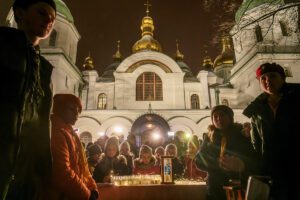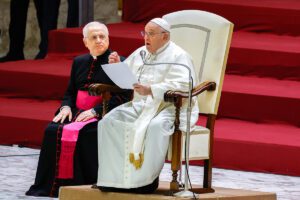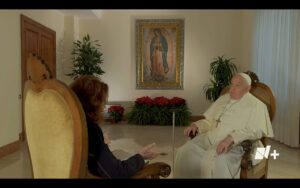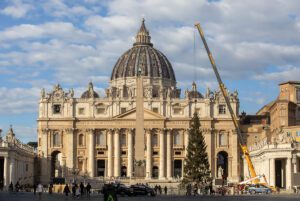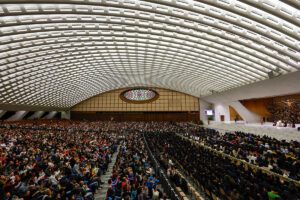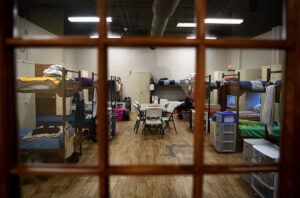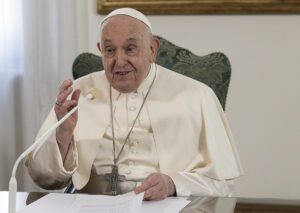INDIANAPOLIS – The 2023 National Catholic Youth Conference had a deep impact on dozens of local high school teens from parishes across the Diocese of Scranton.
For three days – this year Nov. 16-18 in Indianapolis – their faith was enriched through speakers, uplifting music, Eucharistic Adoration, group prayer, the opportunity for the Sacrament of Penance and Daily Mass.
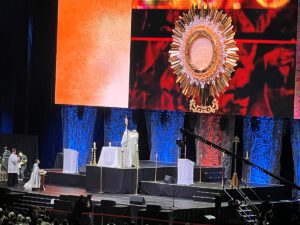
Their faith also is emboldened in witnessing and worshipping with thousands of their Catholic peers, leaving the youths encouraged by the fact that they are not alone in following Christ in the one true church.
“NCYC was truly incredible. I came in, not expecting it to be half of what it was,” Hannah Rocco from Saint Eulalia Parish in Roaring Brook Township, said. “Adoration with 13,000 kids was truly incredible!”
The Diocese of Scranton sent a total of 92 pilgrims – young adults and chaperones – to this year’s conference.
“It was such an awesome experience,” Hayden Schwabe from Saint Jude Parish in Mountain Top, said. “You don’t have to worry about hiding your faith or being scared about putting your hands up in the air to take in the Holy Spirit because other people are doing it.”
For Max Mohutsky of Saint Jude Parish, this year’s NCYC was his first.
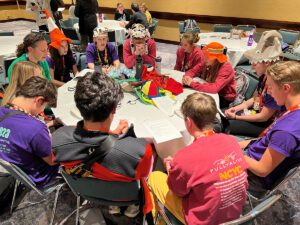
“Obviously I didn’t really know what to expect so I was leaning on what people told me from the past, but it was great once I was there,” he said. “I learned a lot more about God and I met new people and had a great time.”
This was the second NCYC for Shaylee Kimmick of Our Lady Queen of Peace Parish in Brodheadsville.
“I came two years ago, and it was a lot more overwhelming this time because there were so many more people,” Kimmick said. “During the opening ceremony, the archbishop said, ‘You’re not a problem to be solved, you’re a mystery to be revealed,’ and that really stuck with me!”
In a prayer service at the opening session of NCYC, Archbishop Charles C. Thompson spoke to the teens about this year’s NCYC theme “Fully Alive.” He quoted his favorite line from Pope Francis’ encyclical, “Laudato Si,” saying, “Rather than a problem to be solved, the world is a joyful mystery to be contemplated with gladness and praise.”
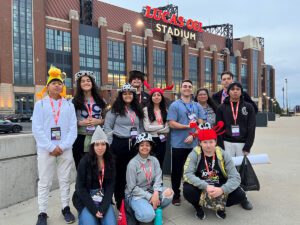
“We heard that beautiful reading about creation from the Book of Genesis,” Archbishop Thompson said. “But the ultimate part of that creation is when God created humanity, when God created us. We are part of that creation that’s been given life by the Spirit breathing into us, by the Word taking root in us, claiming us as his own.”
Kimmick is looking forward to bringing that message home and sharing her experiences with other teens in her Monroe County parish.
“I’m going to talk to people about my experience and try to help them feel more connected in their faith and help them grow,” she said.
Betty Clark of Saint Eulalia Parish described her experience as “simply amazing.”
“The spirit, the energy that everyone had and that we all could feel during the sessions, and when we were talking to other people, we really were ‘fully alive.’ It was crazy. I loved it,” the North Pocono teenager said.
In describing what she was taking away from NCYC, Clark referenced the importance of the National Eucharistic Revival that is underway – and the National Eucharistic Congress which will be held in the same city and stadium July 17-21 next year.
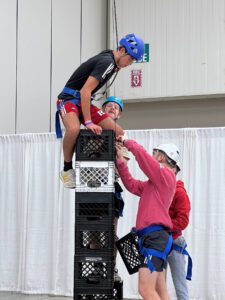
“I think that a lot of time we forget how present Jesus is in the Eucharist and I think that is what the priests and bishops are trying to do with the Eucharistic Revival. I think that I was really impacted by that, and I think it’s going to really help me worship Jesus in the Mass and when I see Him in the Eucharist in the future,” she explained.
During the two-hour closing Mass for NCYC, Auxiliary Bishop Joseph A. Espaillat of New York encouraged the teens to put “joy over fear.”
In explaining this, Bishop Espaillat distinguished between a “worldly fear that creates panic and anxiety” and “a holy fear, or fear of the Lord, (that) is a source of peace and happiness.”
“If we love God and know that we are loved by God, then why do we need to fear?” he asked those in attendance.
Bishop Espaillat then laid out three simple points he wanted the young people at NCYC to take home with them.
“You’ve got to have faith,” he said. “You’ve got to have fun while you do it. And you need family and friends and community along the way.”
Before boarding a bus to make the trip back to northeastern Pennsylvania, George Sabatini of Saint Jude Parish said was proud that so many of his Catholic peers from across the country came together to celebrate their faith.
“It’s just a great experience to strengthen your faith and to meet like-minded people,” Sabatini said.

